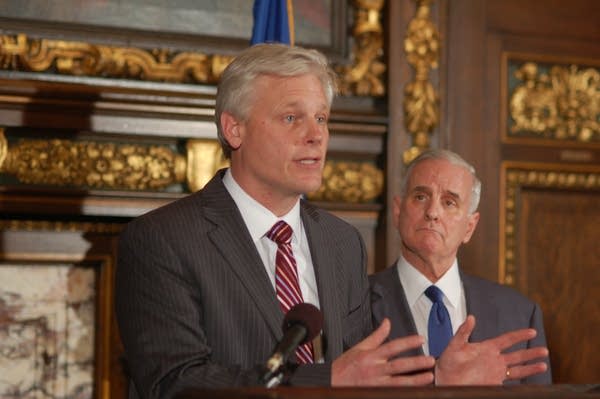Minnesota Legislature 2015: 7 key players
Go Deeper.
Create an account or log in to save stories.
Like this?
Thanks for liking this story! We have added it to a list of your favorite stories.
Seven Minnesota politicians will have an outsized influence at the state Capitol in 2015. Here's a quick look at who they are and where they're coming from.
Kurt Daudt, Republican House speaker

At 41 and with just four years of legislative experience, incoming House Speaker Kurt Daudt may seem like a greenhorn, but supporters see him as a smart and fair leader.
Turn Up Your Support
MPR News helps you turn down the noise and build shared understanding. Turn up your support for this public resource and keep trusted journalism accessible to all.
The new session will test those traits. Daudt will have to negotiate a budget with a DFL Senate and DFL governor. His biggest challenge, though, may be managing expectations among his fellow House Republicans, a politically diverse group intent on keeping their campaign promises.
Daudt, who lives in rural Isanti County, helped swing 11 House seats to the GOP, including 10 in greater Minnesota. Those districts want better roads and bridges but that will take money. Can Daudt find cash for those projects while meeting demands to lower taxes and improve education?
Joyce Peppin, House majority leader

Compared to Daudt, Peppin, 44, is a Minnesota House veteran.
Elected in 2004, the Rogers Republican is considered among the more conservative members of the House. During her tenure, she has routinely opposed big spending projects and supported tax cuts. She also backed a bill to put a voter ID amendment on the ballot and opposed efforts to unionize in-home care workers.
But Peppin told the Star Tribune in November that as second in command, she'll balance her own beliefs against the desires of the entire GOP caucus.
Paul Thissen, House minority leader

Thissen, 48, takes over as House minority leader, the post he held for two years before being elected as House speaker in 2012.
The Minneapolis representative has been a standard-bearer for liberal causes. When he ran the House, Democrats passed funding for statewide all-day kindergarten, legislation to legalize same-sex marriage and a minimum wage increase.
Democrats will be the minority this year. Thissen hasn't ruled out compromise. He agrees a transportation bill is critical. But he remains skeptical of GOP talk about how to create jobs. "To me what they're saying is, 'We need to cut taxes for big corporations.'"
Mark Dayton, governor

Dayton, 67, returns to office facing divided government and a big to-do list.
Besides negotiating a budget, Dayton plans to call for a tax on wholesale gasoline sales to close a $6.5 billion gap in the state's road and bridge fund and may propose an additional half-cent metro area sales tax to pay for transit projects.
He also wants to build on first-term efforts to close the education achievement gap, a goal House Republicans say they share, though they're likely to disagree on methods and spending.
Key questions: What deals will Dayton forge with House Republicans? How will any deal making affect the DFL-controlled Senate? Dayton won't run again but the House and Senate are up for re-election in 2016.
Tina Smith, lieutenant governor

Smith, 56, is new to her executive branch position but not to Dayton's administration. Before she joined him on the ballot, Smith was Dayton's chief of staff.
She moves from a behind-the-scenes role — helping forge compromises on the Vikings Stadium deal and serving as a bridge to the state's business community — to being a public face of the administration.
She'll remain board chair for the Destination Medical Center Corp., a nonprofit overseeing how state dollars are used to expand and improve Rochester, Minnesota, as Mayo Clinic grows. Smith's used that position already to urge legislators to pass a quick but critical tweak to the project's funding law.
Tom Bakk, Senate majority leader

Bakk, 60, has a reputation for going his own way. He's been at odds with House DFLers in the past on some issues, including a new Senate office. Now, Bakk will have to balance legislative priorities against retaining the Senate majority in the 2016 election while facing divided government.
He's hinted he's willing to work with the GOP on some issues. Like House Republicans, Bakk wants a stronger focus on greater Minnesota.
Bakk agrees with Dayton and the House on transportation needs and fixing the state's sex offender program. But on other issues, including a higher education tuition freeze and a ban on online lottery ticket sales, the Cook lawmaker and the governor don't see eye-to-eye.
David Hann, Senate minority leader

Hann, 62, is in his fourth term representing Eden Prairie in the Minnesota Senate, and has served as the GOP's leader since 2013.
Hann is among the more conservative members of his caucus, and has been an outspoken critic of legalizing of same-sex marriage, the state's implementation of a health insurance exchange and he voted against a tax cut bill many members of his party supported because it didn't go far enough.
More recently, Hann led an effort to investigate two DFL lawmakers for using their elected offices for personal gain.


